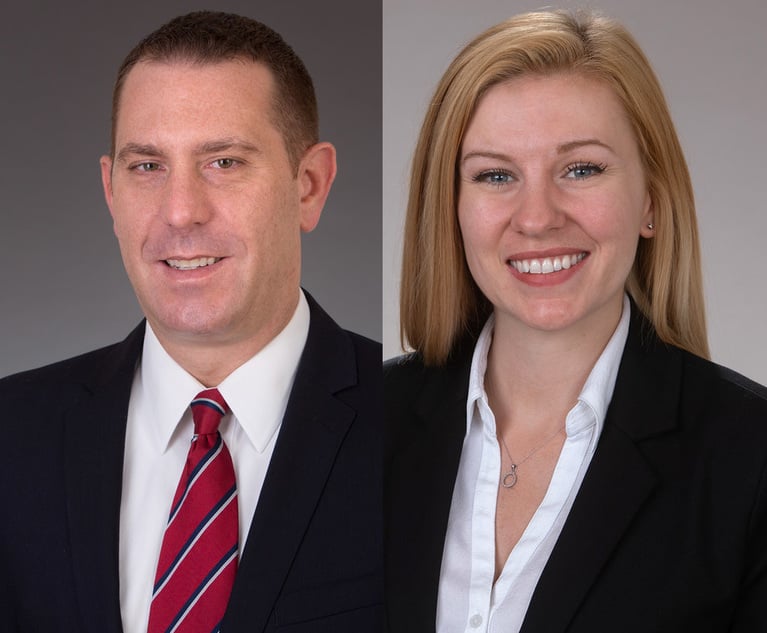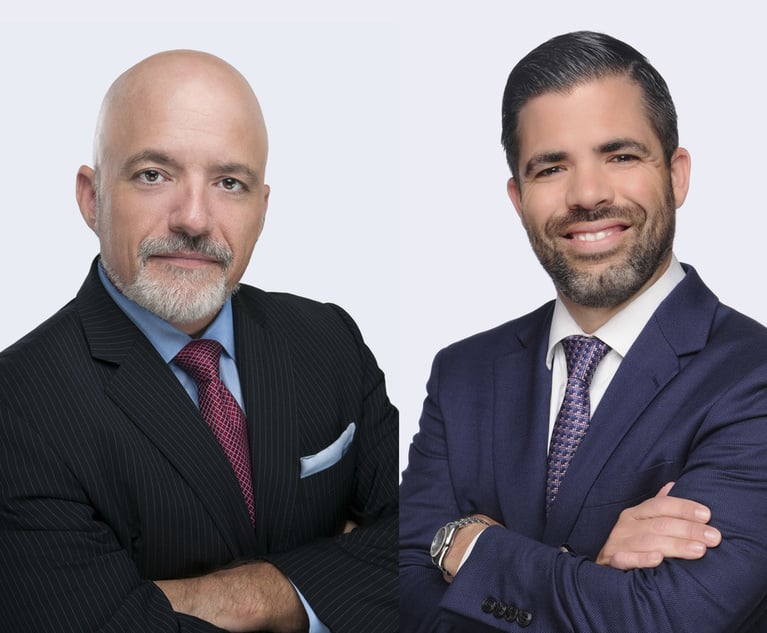 (L-R)Aldo Leiva and Alexander Kosky of Baker Donelson. Courtesy photos
(L-R)Aldo Leiva and Alexander Kosky of Baker Donelson. Courtesy photos VPPA Claims Are on the Rise—Latest Trend in Consumer Privacy Class Action Litigation
This article provides an overview of the VPPA and best practices for your company to mitigate potential risks.
March 17, 2023 at 09:00 AM
5 minute read
Board of ContributorsIt's no secret that plaintiffs firms have been developing legal theories relating to third-party software technologies used on websites. This includes a recent spike in lawsuits alleging that websites running the Meta "Pixel" code are violating the Video Privacy Protection Act (VPPA) by sharing information about visitors' video-viewing habits and history with Meta. These lawsuits continue the growing trend of consumer privacy class action litigation across the country and represent a significant risk to a wide variety of companies. This article provides an overview of the VPPA and best practices for your company to mitigate these potential risks.
VPPA Overview
The VPPA was enacted by Congress in 1988 after then-Supreme Court nominee Robert Bork's video rental history was leaked to a news organization without his consent. Under the VPPA, a "video tape service provider" is generally prohibited from disclosing the personally identifiable information (PII) of a consumer derived from specific video materials or services without their consent. A video tape service provider includes any person engaged in the business of the rental, sale, or delivery of video tapes or "similar audio-visual materials." The open-ended language of that definition has allowed the VPPA to evolve with technology over the last 35 years and is now being used by plaintiffs counsel to target companies in a variety of industries.
This content has been archived. It is available through our partners, LexisNexis® and Bloomberg Law.
To view this content, please continue to their sites.
Not a Lexis Subscriber?
Subscribe Now
Not a Bloomberg Law Subscriber?
Subscribe Now
NOT FOR REPRINT
© 2025 ALM Global, LLC, All Rights Reserved. Request academic re-use from www.copyright.com. All other uses, submit a request to [email protected]. For more information visit Asset & Logo Licensing.
You Might Like
View All
Trending Issues in Florida Construction Law That Attorneys Need to Be Aware Of
6 minute read


Law Firms Mentioned
Trending Stories
- 1'No Retributive Actions,' Kash Patel Pledges if Confirmed to FBI
- 2Justice Department Sues to Block $14 Billion Juniper Buyout by Hewlett Packard Enterprise
- 3A Texas Lawyer Just Rose to the Trump Administration
- 4Hogan Lovells Hires White & Case Corporate and Finance Team in Italy
- 5New York District Attorneys Endorse Governor's Proposed Rollback of Discovery Reforms
Who Got The Work
J. Brugh Lower of Gibbons has entered an appearance for industrial equipment supplier Devco Corporation in a pending trademark infringement lawsuit. The suit, accusing the defendant of selling knock-off Graco products, was filed Dec. 18 in New Jersey District Court by Rivkin Radler on behalf of Graco Inc. and Graco Minnesota. The case, assigned to U.S. District Judge Zahid N. Quraishi, is 3:24-cv-11294, Graco Inc. et al v. Devco Corporation.
Who Got The Work
Rebecca Maller-Stein and Kent A. Yalowitz of Arnold & Porter Kaye Scholer have entered their appearances for Hanaco Venture Capital and its executives, Lior Prosor and David Frankel, in a pending securities lawsuit. The action, filed on Dec. 24 in New York Southern District Court by Zell, Aron & Co. on behalf of Goldeneye Advisors, accuses the defendants of negligently and fraudulently managing the plaintiff's $1 million investment. The case, assigned to U.S. District Judge Vernon S. Broderick, is 1:24-cv-09918, Goldeneye Advisors, LLC v. Hanaco Venture Capital, Ltd. et al.
Who Got The Work
Attorneys from A&O Shearman has stepped in as defense counsel for Toronto-Dominion Bank and other defendants in a pending securities class action. The suit, filed Dec. 11 in New York Southern District Court by Bleichmar Fonti & Auld, accuses the defendants of concealing the bank's 'pervasive' deficiencies in regards to its compliance with the Bank Secrecy Act and the quality of its anti-money laundering controls. The case, assigned to U.S. District Judge Arun Subramanian, is 1:24-cv-09445, Gonzalez v. The Toronto-Dominion Bank et al.
Who Got The Work
Crown Castle International, a Pennsylvania company providing shared communications infrastructure, has turned to Luke D. Wolf of Gordon Rees Scully Mansukhani to fend off a pending breach-of-contract lawsuit. The court action, filed Nov. 25 in Michigan Eastern District Court by Hooper Hathaway PC on behalf of The Town Residences LLC, accuses Crown Castle of failing to transfer approximately $30,000 in utility payments from T-Mobile in breach of a roof-top lease and assignment agreement. The case, assigned to U.S. District Judge Susan K. Declercq, is 2:24-cv-13131, The Town Residences LLC v. T-Mobile US, Inc. et al.
Who Got The Work
Wilfred P. Coronato and Daniel M. Schwartz of McCarter & English have stepped in as defense counsel to Electrolux Home Products Inc. in a pending product liability lawsuit. The court action, filed Nov. 26 in New York Eastern District Court by Poulos Lopiccolo PC and Nagel Rice LLP on behalf of David Stern, alleges that the defendant's refrigerators’ drawers and shelving repeatedly break and fall apart within months after purchase. The case, assigned to U.S. District Judge Joan M. Azrack, is 2:24-cv-08204, Stern v. Electrolux Home Products, Inc.
Featured Firms
Law Offices of Gary Martin Hays & Associates, P.C.
(470) 294-1674
Law Offices of Mark E. Salomone
(857) 444-6468
Smith & Hassler
(713) 739-1250






